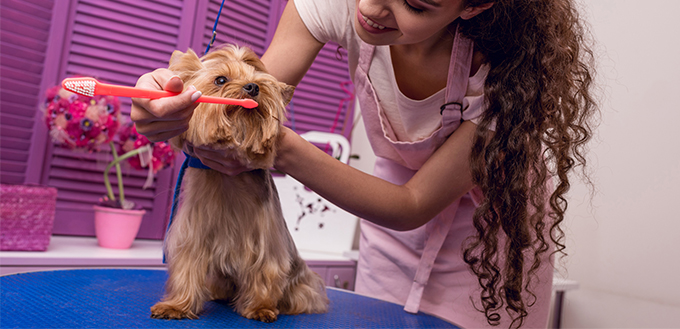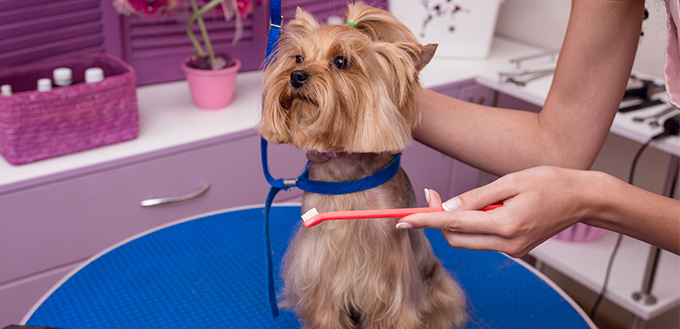There are a number of pet owners who simply fail to recognize the importance of ensuring optimum oral and dental health in dogs. After all, their canine ancestors were able to live through the ages without canine toothpastes, toothbrushes, and dental chews. However, this clearly doesn’t mean we can go about letting them go on without taking good care of their oral health. Here’s why canine oral health is so important.
You May Also Like: Dental Chews for Dogs
Reduces the Number of Bacteria and Other Microorganisms in the Oral Cavity
The canine oral cavity is home to an amazing array of bacteria and other microorganisms. They are the usual residents of a dog’s oral cavity. They do not produce disease or any problem yet since the saliva of dogs, much like humans, contains certain substances that somehow inactivate these microorganisms. Over time however, these microorganisms grow in number to the extent that the natural defense mechanism of the canine oral cavity can no longer mitigate the microbes’ action on the oral cavity, particularly the teeth.
Meticulous canine oral health care can help reduce the number of these harmful microorganisms by killing most of them at a time. While it is virtually impossible to kill all microorganisms and render the canine oral cavity as sterile, oral care like regular use of dental chews and toothbrushing with appropriate canine toothpaste can help reduce the number of germs to the extent that the remaining organisms are inactivated by the dog’s innate defense mechanisms.
You May Also Like: Dog Toothbrushes
Prevents the Growth and Proliferation of Bacteria
Bacteria and other microorganisms rely on a good source of sugars for them to grow and multiply. Most of the commercially available food that we give to our dogs contains a lot of starches often as fillers. These starchy substances can get stuck on the surface of the dog’s teeth as well as in the space between teeth and gums. What this simply means is that we are essentially giving our pooches fuel for microorganisms to grow and proliferate.
It is for this reason that brushing the canine teeth with appropriate toothpaste or even providing our dogs with the right dental chew can help remove these starches and other food debris that may have stuck in the dentition and gums of our dogs. This way we remove the fuel needed by these microorganisms to grow and multiply.

Retards the Formation or Development of Plaque and Tartar
If bacteria is allowed to grow and proliferate on the surface of your dog’s teeth, not only will they proliferate, they will also produce a very sticky, colorless, and very thin layer of film that hardens to become what most of us know as plaque. In the health care community, they call it a biofilm for the simple fact that it is secreted by biological organisms. The thing is that this plaque is what protects the bacteria underneath it. It is like a very strong roof that they put over their heads so that they don’t get attacked by salivary immune system cells as well as mediocre brushing of the teeth.
When this is allowed to continue, the bacteria underneath the plaque slowly eat away at the enamel layer of the teeth. This releases certain chemicals like calcium into the plaque where it hardens or calcifies to make it even more resistant against mechanical abrasion. Because of the deposition of minerals into the plaque, it takes on a more distinct brownish color and has also grown both in thickness and in width. We’re more familiar with this as tartar. As you know tartar is a very tough layer that only a dentist can remove. That is why it is imperative to care for our dog’s teeth even before the plaque has turned to tartar. If not, then we have no choice but to seek the services of a veterinary dentist to remove the plaque and the tartar.
Freshens Dog Breath
Did you know that bad breath in dogs is actually a mixture of the dog food that we give, our dog’s saliva, and the noxious gases that bacteria in their oral cavity produce? Well, the point is that the more bacteria present in your dog’s oral cavity the greater is the chance of it having bad breath. So, removing these bacteria not only provides for healthier gums and shinier and stronger teeth, it also helps provide for fresher breath in our pooches.
Related Post: Dog Dental Spray

Helps Prevent Tooth Decay, Periodontal Disease, and Systemic Conditions
Remember what we said about plaque and tartar providing protective cover for the bacteria underneath? Well, as these bacteria are shielded, they continue to eat away at the surface of the teeth until they get past through the first layer of dental defense – the enamel. Once they’ve broken through this almost impenetrable layer, it should be very easy to tunnel through the dentin layer. This is the part of the teeth that is filled with nerve endings, live tissues, and blood vessels. As soon as bacteria gain entry into the dentin layer of the teeth, your dog now has tooth decay.
Give it some more time and the decay can reach to the deeper structures or the canine teeth. It also begins invading the gums, initiating an inflammatory reaction we know as gingivitis. It is this combination of tooth decay and gingivitis that officially signal the beginning of periodontal disease. Sadly, it doesn’t end there. If the infection is not contained, bacteria can gain entry into the blood and are distributed to other susceptible organs of the dog’s body. This can lead to infections or inflammatory conditions in other body parts.
Meticulous canine oral care can help prevent the development of tooth decay and halt its progression into periodontal disease. Plaque and tartar can be effectively removed by a licensed veterinary dentist while remaining microorganisms in the oral cavity of your dog can be eradicated through the use of canine enzymatic toothpastes as well as other medicated canine dental formulations.
Taking care of your dog’s oral and dental health simply means reducing the number of harmful microorganisms residing in the oral cavity. It also entails the retardation of bacterial proliferation and the prevention of the formation of plaque and tartar. Ultimately, meticulous canine oral care can help prevent tooth decay, gum disease, and other health conditions in your dog.
Sources:
- Pet Dental Care, American Veterinary Medical Association
- 10 Facts You Need To Know To Protect Your Pet’s Oral (And Overall!) Health, American Animal Hospital Association







